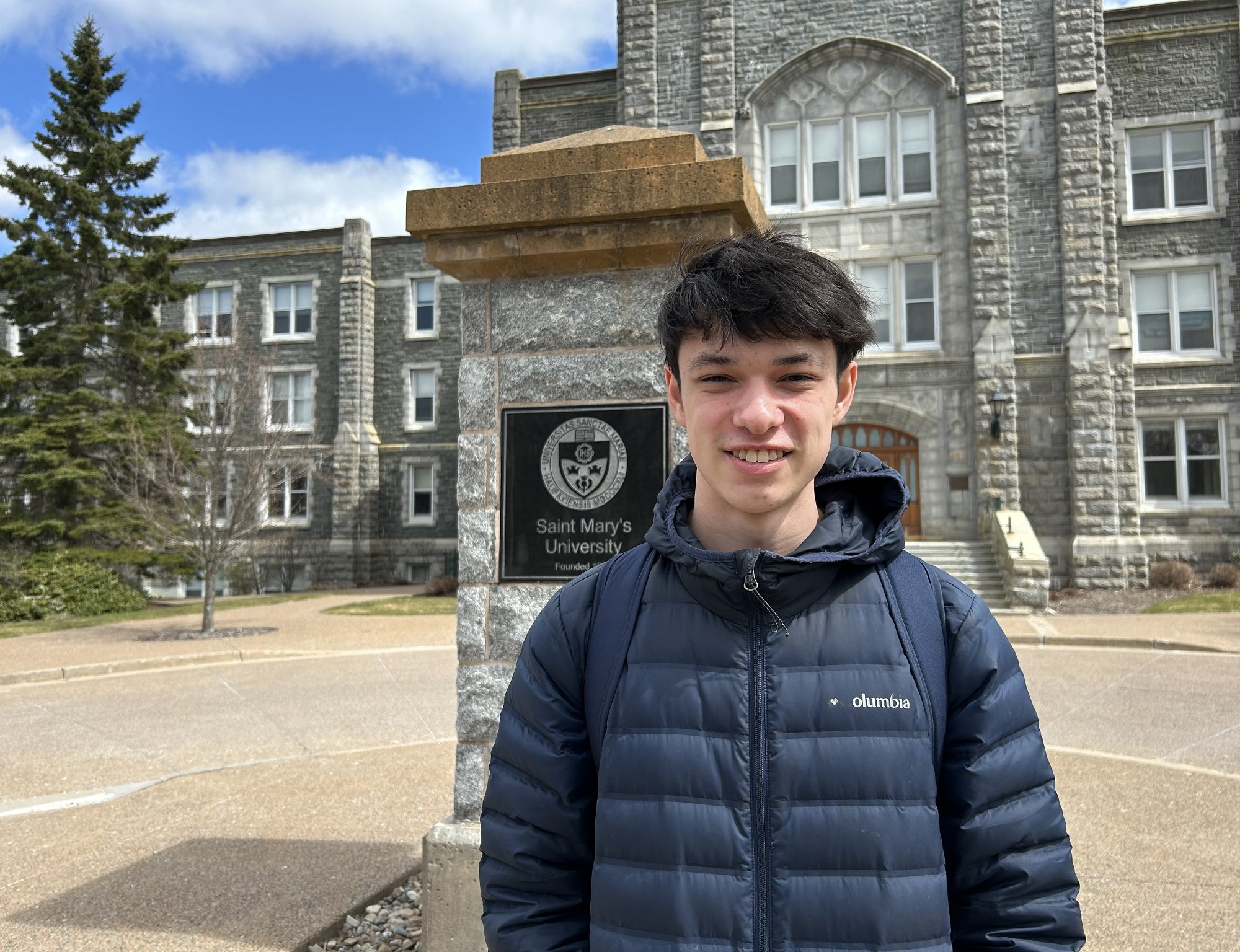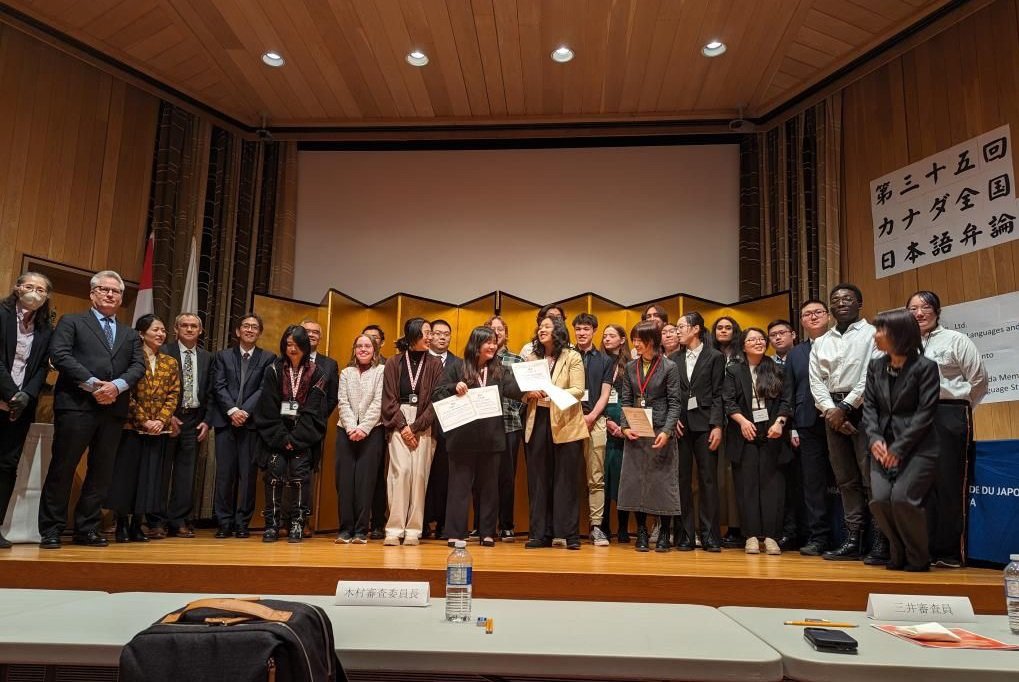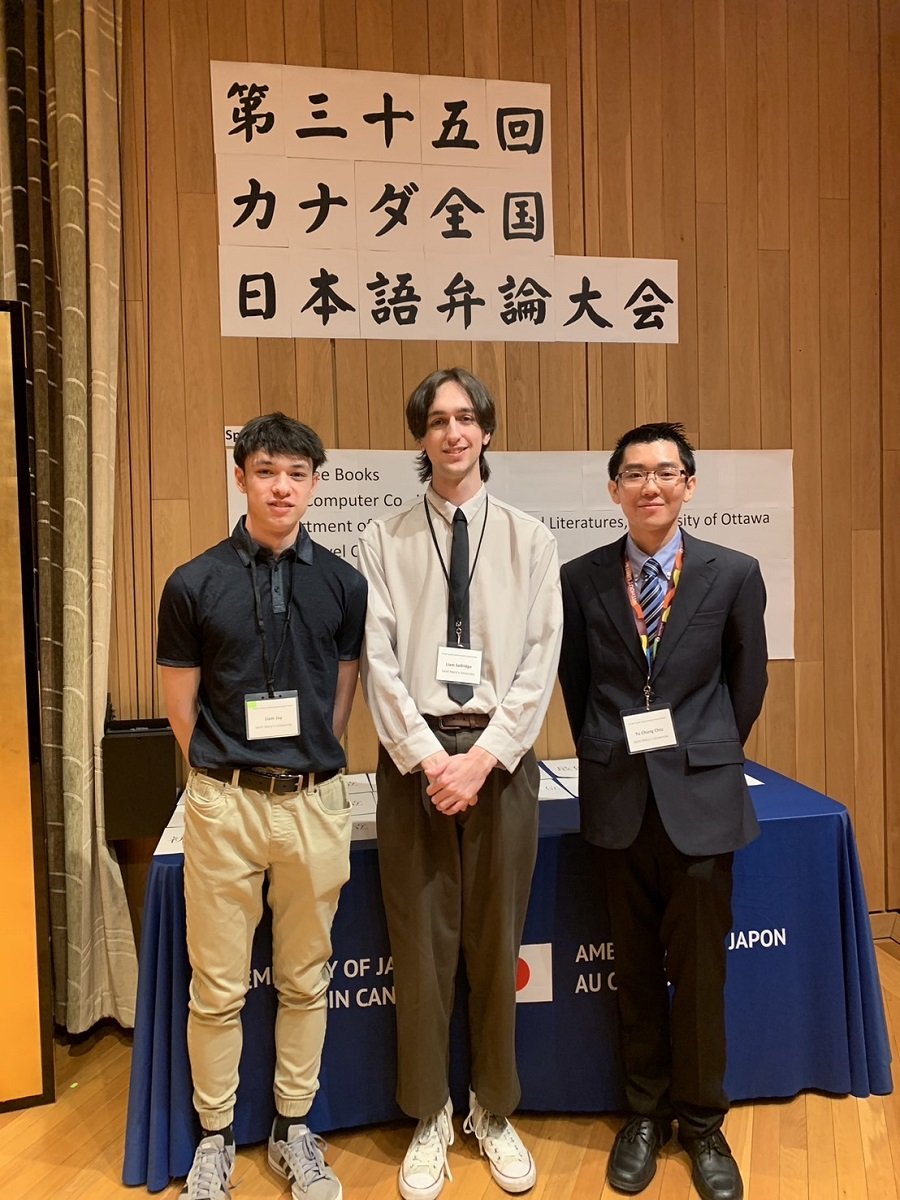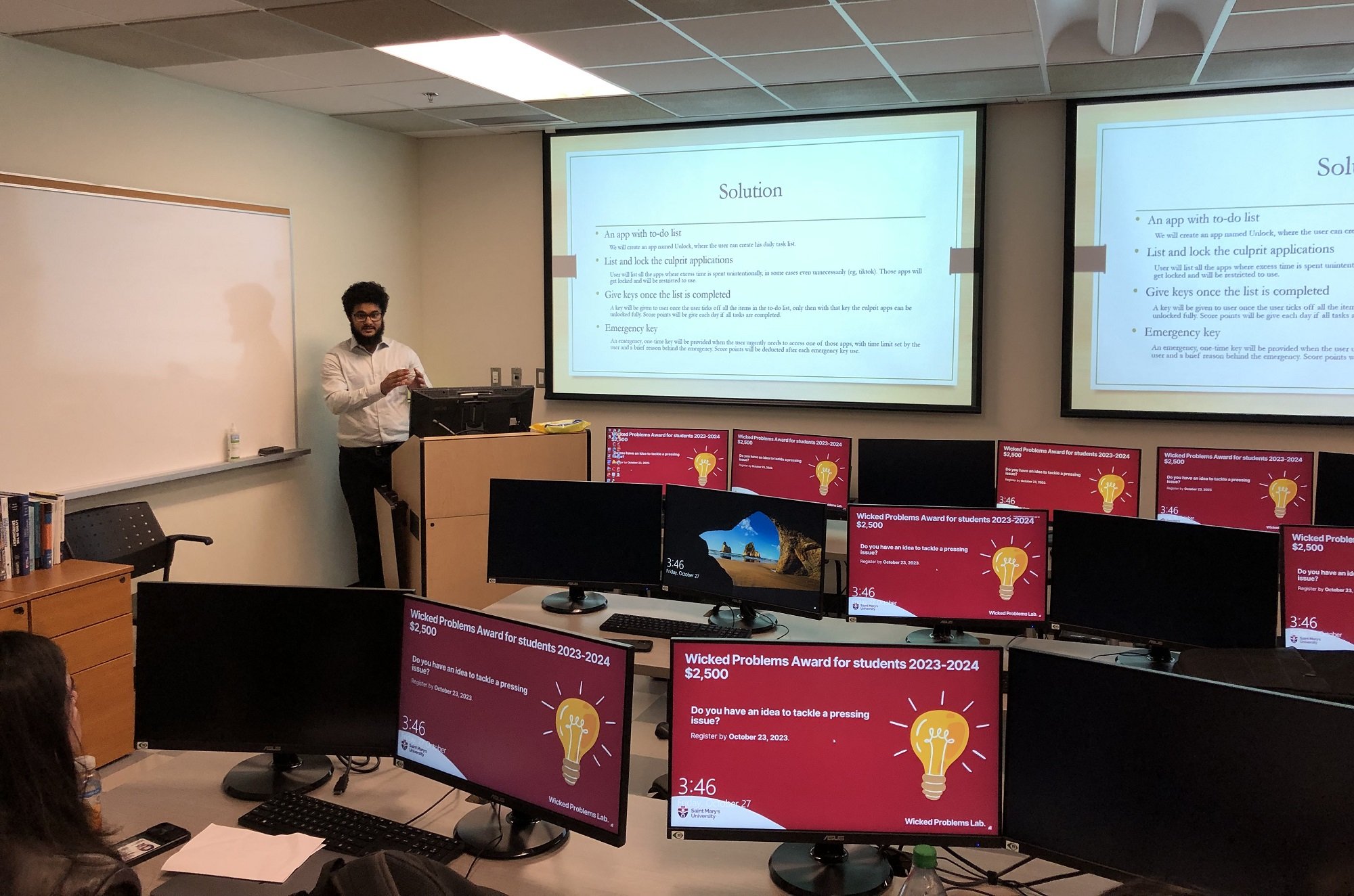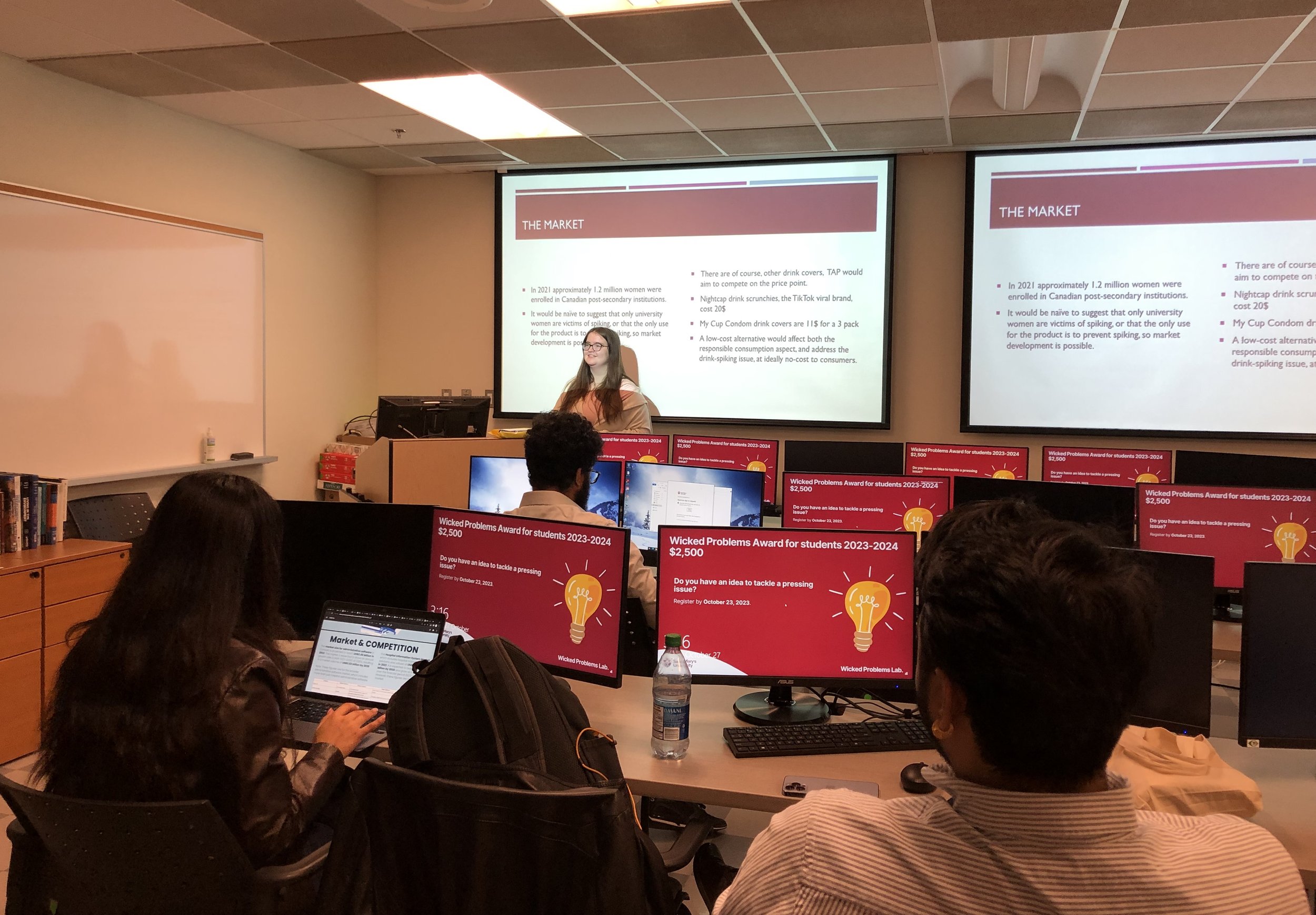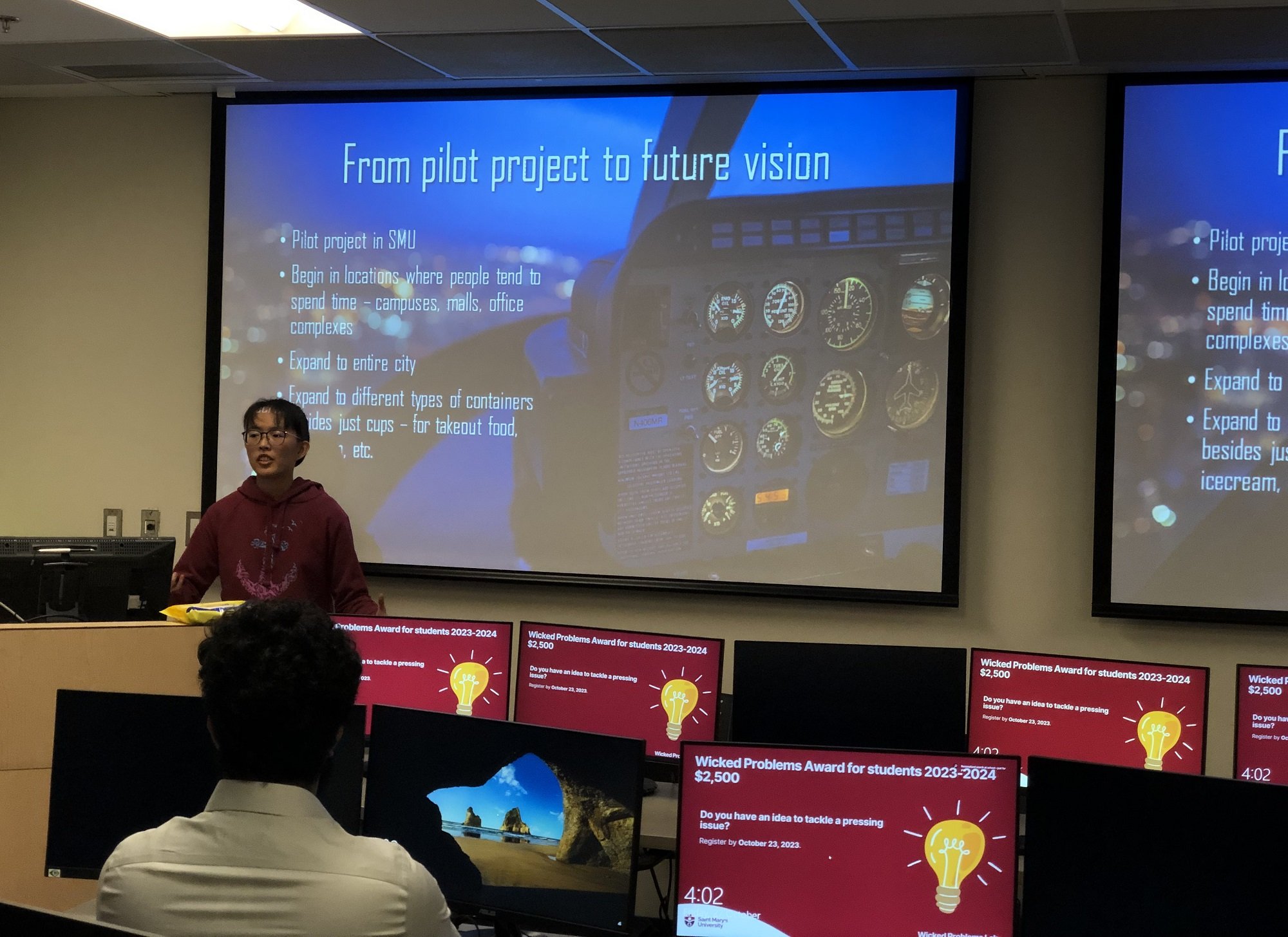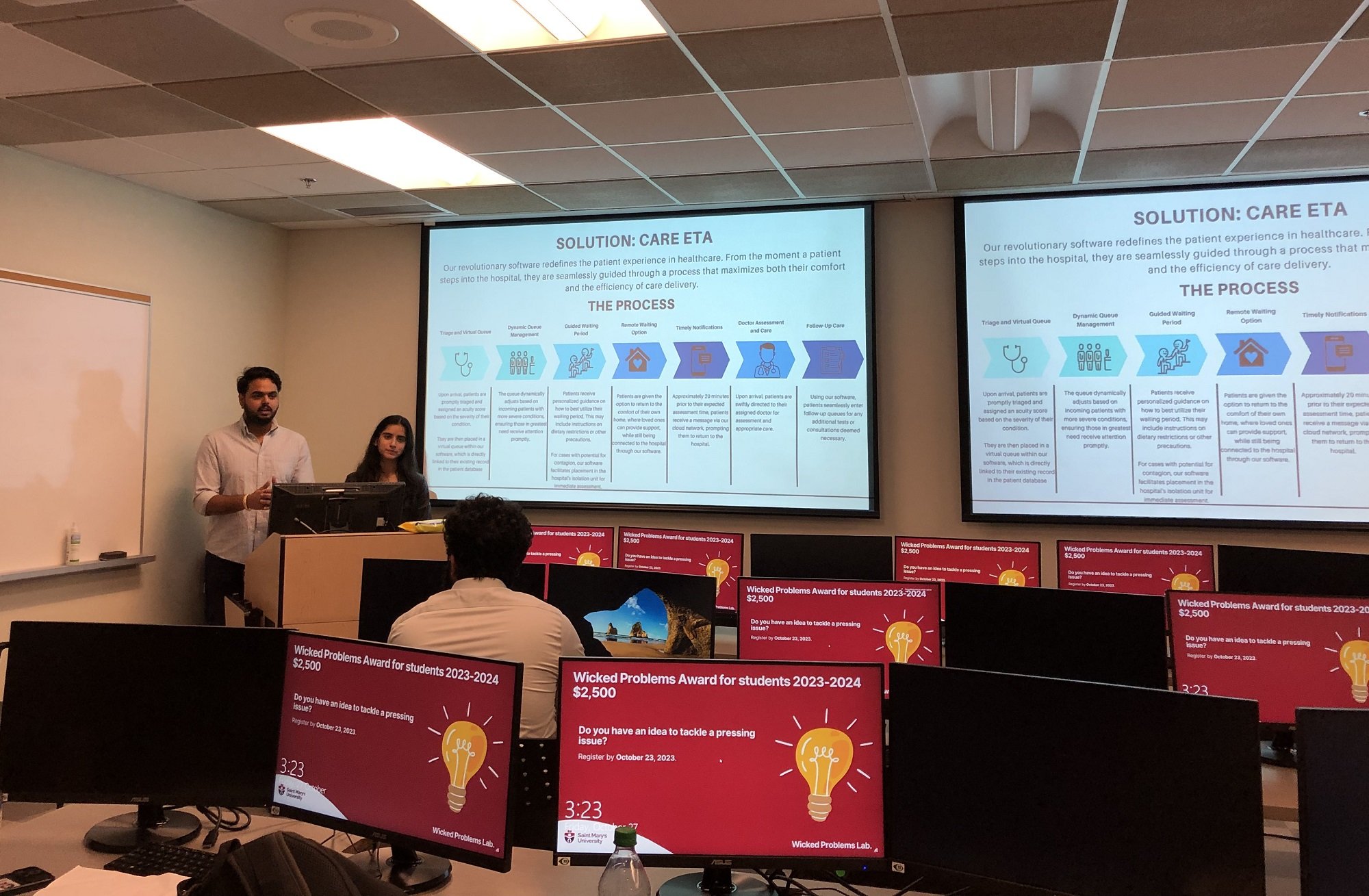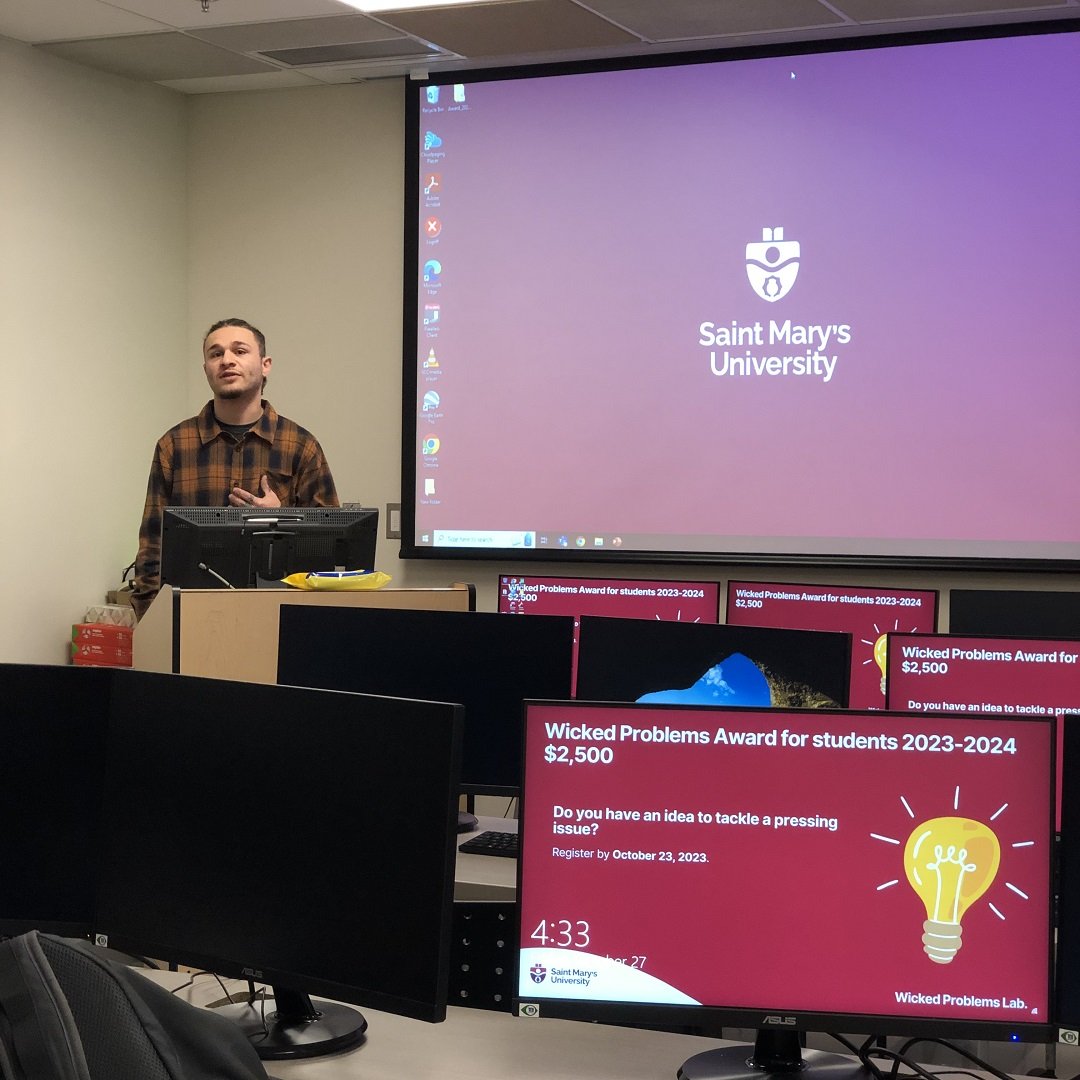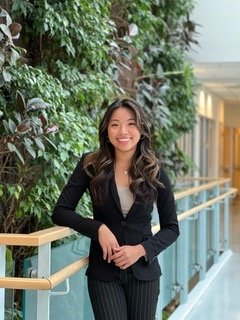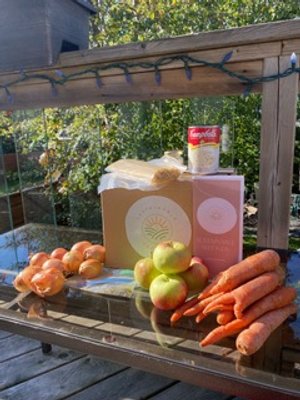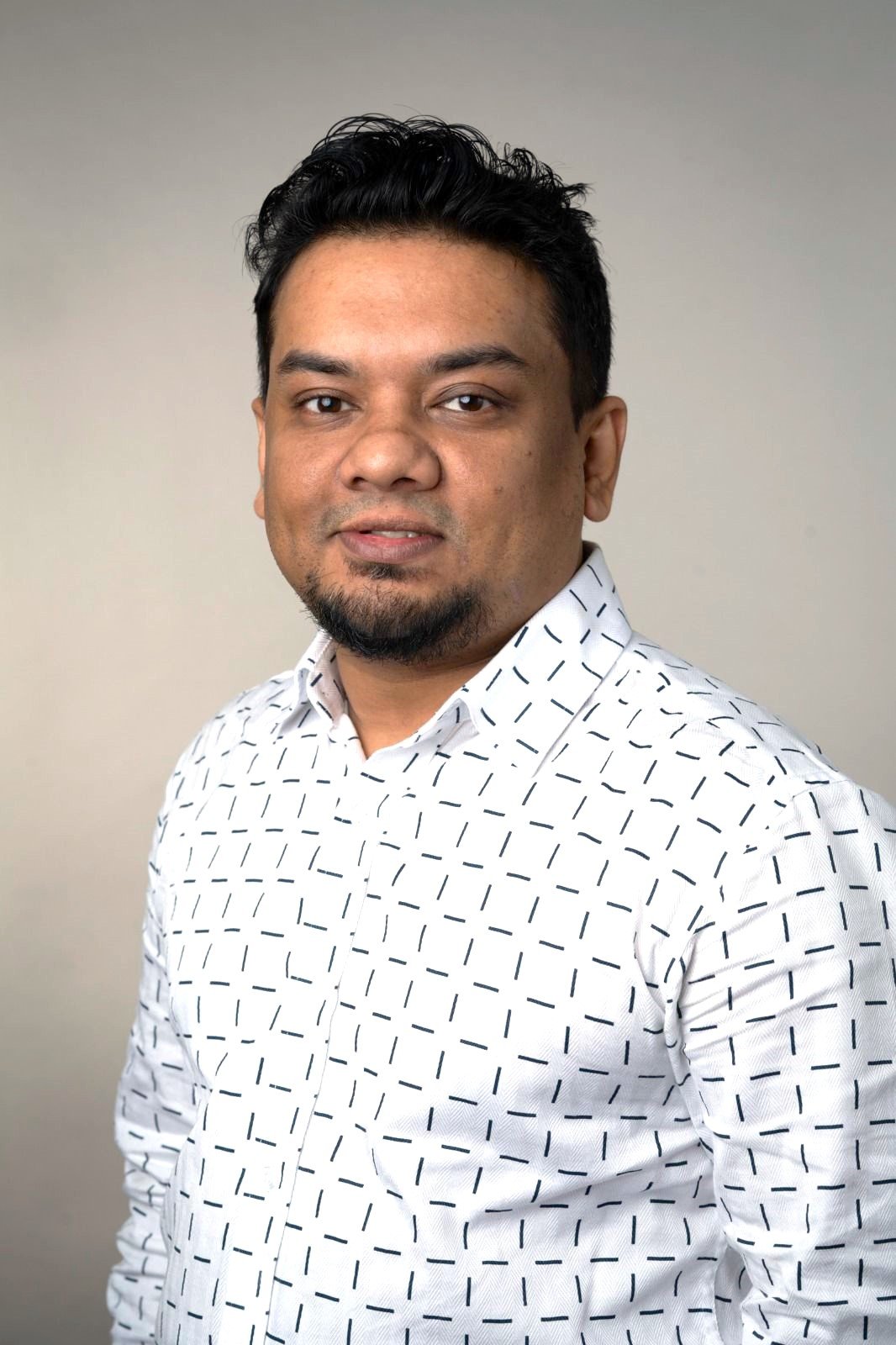Undergraduate students are conducting research with faculty members again this summer, thanks to funding from federal grants, generous donors and Saint Mary’s.
The halls and classrooms at Saint Mary’s are a little quieter after the end of the winter term and the excitement of convocation, but students keen to engage in research activities are creating a buzz on campus.
Every summer, a group of students are chosen to receive undergraduate student research awards. These awards allow students to conduct research and scholarly projects with professors in their fields. These paid internships allow students to learn valuable skills that will serve them well in upper-level courses and eventually in their own honours or graduate-level research.
Many of these award positions are funded by federal government agencies, including the National Science and Engineering Research Council of Canada’s (NSERC) Undergraduate Student Research Awards program and the Social Sciences and Humanities Research Council (SSHRC). Others are offered thanks to generous donors, grants, and funding from Saint Mary’s. In most cases, awards are made possible through contributions from professors’ research grants. Those who receive awards are provided funding to undertake 12 to 16 weeks of full-time work between May and August.
A new category of award was introduced for full-time students in the Faculty of Science for summer 2024 to include a wider array of students. Designed for student-professor teams who propose a research project together, the Dean of Science Access to Research Awards focus on the proposed research project; the student's GPA is not a selection criteria as long as the student is in good academic standing. These awards are jointly funded by the Dean of Science Office and various faculty grants.
These summer research award programs are a great opportunity for our students. However, there are many other opportunities for students to work alongside professors. With research taking place year-round in labs and in the field, students are encouraged to connect with professors to discuss additional opportunities!
Benefits
“Summer research placements give students a chance to experience research work that complements their academic studies,” says Dr. Adam Sarty, Associate Vice-President, Research. “This program of Research Awards provides our most engaged and talented students with experiences that not only raise their connection to their studies but also greatly enhance their road to success post-graduation in either the job market or in pursuit of graduate studies. A good number of professors start their academic journey through these kinds of undergraduate research experiences.”
Selecting student researchers
For most positions, students earn their positions based on their academic record, breadth of experience and background, and their application letter—they can apply after their first year of full-time study. If chosen, they are matched with a professor whose work is a fit for their desired research. The Dean of Science Access to Research Award winners are selected based on the prospective value of the experience to both the student and supervisor.
Previous wins aren’t considered in the selection process; however, students with top academic records can earn positions in multiple years. Many Saint Mary’s students have gone on to pursue graduate studies, thanks in part to the experience gained during their summer work on campus.
Learn about this year’s student researchers
Learn about student research opportunities at Saint Mary’s.
Taylor Adams
Fourth year, Honours Biology
Supervisor: Dr. Laura Weir
Research: Conducting research on Japanese medaka (Oryzias latipes) evolution by sexual selection. I will be constructing a pedigree to link reproductive success of lineages with different morphological and behavioural characteristics.
Molly Carruthers
Fourth year, Psychology
Supervisor: Meg Ternes
Research: I will be working with Meg on research relating to deception detection
Sarah Chiasson
Third year, Environmental Science
Supervisor: Dr. Colleen Barber
Research: This summer I’ll be studying European Starlings with Dr. Colleen Barber’s lab, studying the birds’ behaviour, including mate choices and parental investment. To do so, we survey the European Starling population on campus, tracking the individuals through their life cycle.
Claire Cullinan
Third year, Biology with a certificate in forensic science
Supervisor: Dr. Christa Brosseau
Research: I will be doing biochemistry research on the development of diagnostic sensors for healthcare applications. I will be using plasmonic metal nanoparticles to develop nanoparticle-based sensors.
Noha Jereen Hoque
Fourth year, Honours Physics
Supervisor: Vincent Hénault-Brunet
Research: Our research group aims to explore the content, formation, and evolution of black holes in globular star clusters, which are spherical, tightly bound clusters of tens of thousands to millions of old stars around the Milky Way. We need to understand how black holes form, stay and change within these clusters to explore our universe at very large distances.
Abby Jolly
Third year, Social Justice and Community Studies
Supervisor: Dr. Val Marie Johnson
Research: This summer I will be partnering with the Centre for Migrant Worker Rights Nova Scotia, doing research on access to healthcare for seasonal agricultural workers in Nova Scotia.
Alicia MacDonald
Third year, Psychology
Supervisor: Dr. Nicole Conrad
Research: We will be doing a pilot study on a measure of reading comprehension in grades three and four children. We will also be writing a paper on orthographic knowledge and spelling outcomes.
Mimi MacNeily BSc’24
Major: Psychology
Supervisor’s name: Dr. Tiffany Vu
Research: Assisting in the development and testing of theories grounded in marketing, psychology, and behavioural economics pertaining to charitable giving, sustainability, and consumer well-being.
Jillian Marks
Second year, Engineering
Supervisor: Dr. Jane Ferguson
Research: Using innovative methods to measure key properties of molten salt mixtures for the development of clean energy sources.
Tehya Mohammed
Second year, Chemistry and Physics
Supervisor: Dr. Robert Singer
Research: We are optimizing the N‑Demethylation process of alkaloids to make it greener. This is an important step in the synthesis of compounds like naltrexone and naloxone.
Katherine Myers BSc’24
Major: Honours Astrophysics
Supervisor: Dr. Marcin Sawicki
Research: Studying star formation and substructure trends in distance galaxy mergers using data from the James Webb Space Telescope.
Keegan Riggs
Astrophysics
Supervisor: Dr. Luigi Gallo
Research: Using data from an x-ray space telescope to analyze blackholes
Madhur Sharma
First Year, Computing Science and Business Administration
Supervisor: Dr. Ethan Pancer
Research: Marketing and AI. We will be analysing the speed of spread and work closely with how virality works to understand the algorithm of different socials.
Daniel Wilson
Third year, Biology and Geography
Supervisor: Dr. Erin Cameron
Research: I'm working on mapping in ArcGIS related to Indigenous knowledge of berry crops in the Northwest Territories and the spread of invasive earthworms in Alberta, Saskatchewan, and the Yukon. In addition, there's also fieldwork sampling invasive earthworms in North Alberta with the goal of identifying species and determining their rate of spread.
Clara Wrightman-Dillon
Second year, Astrophysics
Supervisor: Marcin Sawicki
Research: I will be analyzing photos from the JWST of the Sparkler Galaxy.
Katherine (Katie) Zinck
Third year, Chemistry
Supervisor: Dr. Danielle Tokarz
Research: I will be using polarization-resolved second harmonic generation microscopy and birefringence to investigate the degradation of otoconia (inner ear crystals that maintain balance) and the structure of teeth.
Megan Barkhouse
Second year, Biology
Supervisor: Dr. Anne Dalziel
Research: I will be involved in the collection, care, and research of stickleback and killifish.
Sydney Blackmore
Third year, Astrophysics
Supervisor: Dr. Greg Christian
Research: As per the description found on the SMU research opportunities webpage: the “… project will consist of analysis of recoil singles data from an experiment measuring the 22Ne(alpha, n)25Mg reaction. This reaction is important as a neutron source for the slow neutron capture process, which creates around half of the elements heavier than hydrogen."
Rachel Crawford
Fifth year, Biology & Psychology double major, with a certificate in Health, Wellness, and Sport in Society.
Supervisor: Dr. Nicole Conrad.
Research: I'll be working with Dr. Conrad to study the effects of orthographic knowledge on reading comprehension in children and to pilot reading comprehension testing materials with elementary school-age students.
Maria Dereje
Second year, Criminology
Supervisor: Dr. Veronica Stinson
Research: A variety of projects and developing research skills
Rebecca ElChater
Fourth year, Double major in Biology and Psychology, with an Honours in Chemical Biology
Supervisor: Dr. Clarissa Sit
Research: I will be studying Fictibacillus enclensis, which is a bacteria that can promote plant growth and act as a natural fertilizer. I will perform extractions and sample analyses to determine its mechanism of action on plants.
Yacklin Huang
First year, undetermined major.
Supervisor: Dr. Mengjun Hu
Research: Discuss Data Analytics topics with supervisor weekly; read classic textbooks of relevant directions to gain important insights.
Zéa Jones
Fourth year, Anthropology and Religious Studies
Supervisor: Dr. Sveva Savelli
Research: Reviewing field notes and aiding in excavations at Incoronata greca, in Italy.
Zoe MacDonald
Third year, Psychology
Supervisor: Dr. Jim Cameron
Research: Very broadly- exploring the psychology of astronomy, as in feelings of awe (often induced via astronomical events) and how it can increase social cohesion/global citizenship identification and prosocial behaviour, as well as more general attitudes and beliefs surrounding astronomy, life in the universe, etc.
Baxter Madore
Fourth year, Honours Computer Science
Supervisor: Dr. Stavros Konstantinidis
Research: I am currently modernizing and adding features to the I-LaSer formal language web server at SMU.
Lindsey McNamara
Fourth year, Honours Mathematics
Supervisor: Dr. Mitja Mastnak
Research: I will be studying the simultaneous triangularization of collections of matrices and further topics in linear algebra/abstract algebra.
Janine Mombourquette
Fourth year, Honours Biology
Supervisor: Dr. Laura Weir
Research: Conducting research with Japanese medaka (Oryzias latipes).
Lucy Pothier-Bogoslowski
Fourth year, Honours Astrophysics
Supervisor: Dr. Luigi Gallo
Research: I am working on observational high energy astrophysics with X-ray data taken of active galactic nuclei. This work probes the extreme regions around supermassive black holes.
Sarina Scoville
Fourth year, Biology
Supervisor: Dr. David Chiasson
Research: My research project will encompass molecular and synthetic biology, as well as microbiology. Under the supervision and support of Dr. Chiasson, my research will focus on the identification of genes related to nitrogen-fixation and the symbiotic relationship between nitrogen-fixing bacteria and legumes.
Connor Smith
Third year, Chemistry
Supervisor: Jane Ferguson
Research: My research this summer is to help design and start construction of an Archimedean density apparatus to measure the density of molten salt systems.
Kaveh Wornell
Third year, Biology
Supervisor: Dr. Laura Weir
Research: This project will explore the metabolic costs of courtship behaviour in Japanese medaka. In this species, males perform a characteristic courtship 'dance' to attract females and advertise their fertility. Furthermore, the degree to which fin size may increase or decrease the metabolic demands of the behaviour is not known. This work will entail a physiological study to assess the difference between the metabolic rate of males at rest and while they are performing the courtship behaviour.

















